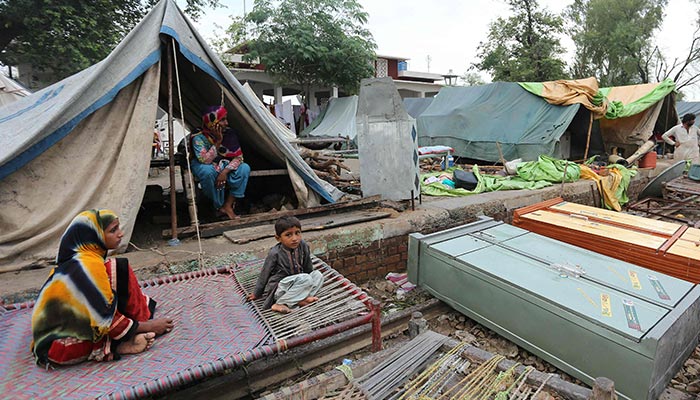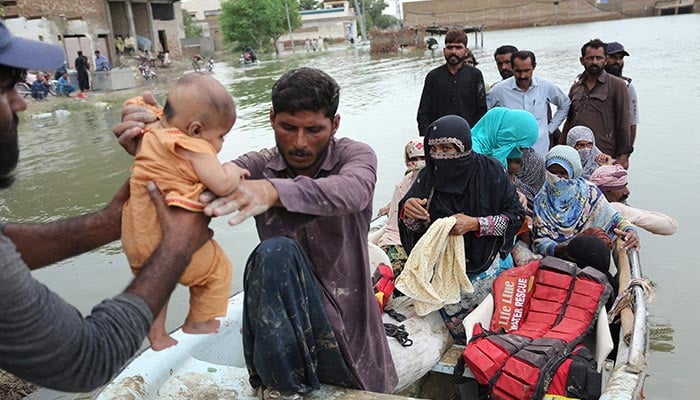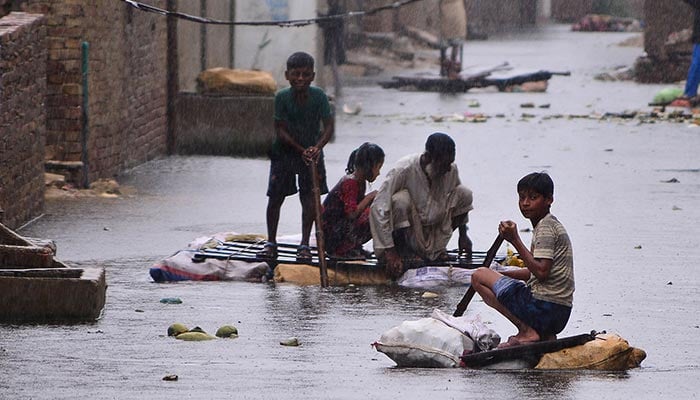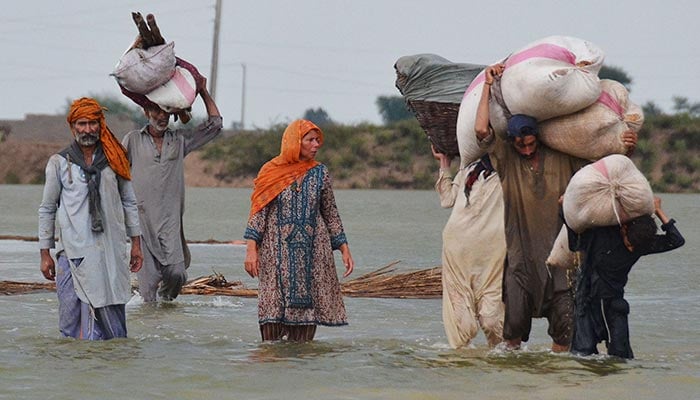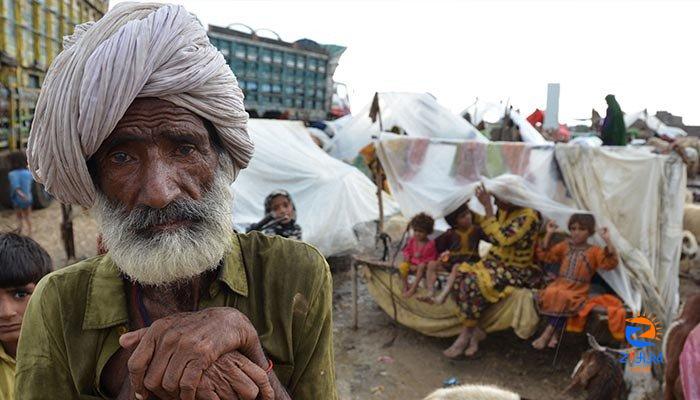
[ad_1]
KARACHI: Pakistan on Wednesday appealed for international assistance with increasing devastations in flood-hit areas across the country, particularly in areas of Sindh, Balochistan and South Punjab.
The government has sought international community’s support in relief efforts, as the country struggles to muddle through the catastrophic impact of climate change in the region.
The ongoing torrential rains in the country has killed over 800 people, damaged homes and infrastructure, and ruined crops and vegetation across agricultural land further deteriorating the country’s already struggling economy.
The cash-strapped nation is facing trouble in funding and rehabilitation efforts while awaiting the International Monetary Fund’s (IMF) approval for release of the required bailout package .
‘Catastrophe of epic scale’
Climate Change Minister Sherry Rehman said authorities would launch an appeal for international help once an assessment was complete.
Record monsoon rains were causing a “catastrophe of epic scale”, Pakistan’s climate change minister said, announcing an international appeal for help in dealing with floods causing havoc since June.
“Given the scale of the disaster there is no question of the provinces, or even Islamabad, being able to cope with this magnitude of climate catastrophe on their own,” she told AFP.
“Lives are at risk, thousands homeless. It is important that international partners mobilise assistance,” she said.
Pakistan is eighth on a list of countries deemed most vulnerable to extreme weather caused by climate change, according to the Global Climate Risk Index compiled by environmental NGO Germanwatch.
“It has been raining for a month now. There is nothing left,” a woman named Khanzadi told AFP in badly hit Jaffarabad, Balochistan province.
“We had only one goat, that too drowned in the flood… Now we have nothing with us and we are lying along the road and facing hunger.”
Planning, Development and Special Initiatives Minister Ahsan Iqbal in a press conference, said that the federal government has also appealed to the international development partners for assistance, so the reconstruction of infrastructure destroyed by the flooding can be started once the water recedes.
Prime minister’s relief fund
Minister for Information and Broadcasting Marriyum Aurangzeb released details for depositing donations in the Prime Minister’s Flood Relief Account 2022.
“State Bank of Pakistan had issued a circular for collection of donations through all commercial banks,” she said, adding that local and overseas Pakistanis could deposit donations in this account.
Donations to the fund could be deposited in the Prime Minister Relief Fund Account 2022 Account No. G-12164.
“All commercial banks and their branches could collect donations in the Prime Minister Flood Relief Fund 2022” State Bank of Pakistan’s circular read.
Overseas Pakistanis can also send donations through wire transfers, money service bureaus, money transfer operators, and exchange houses.
Donations can also be deposited in cash at all commercial banks.
Sindh Flood Relief Fund
Sindh government has announced the Sindh Flood Relief Fund for affectees of the ongoing torrential rains and flooding in the province, a notification issued by the provincial finance department read.
The fund has been initiated to seek financial support for victims in the province hit hard by extreme weather patterns. Donations for the fund will also be made through net monthly salaries of ministers including Chief Minister (CM) Syed Murad Ali Shah, PPP’s provincial assembly members, advisors, CM’s special assistants, Parliamentary secretaries, officers, and officials.
Earlier, CM Murad — in a televised message — also urged philanthropists, welfare organisations, donor agencies, and affluent individuals to help flood affectees following the massive toll of devastation recorded in the province.
“We are trying to arrange tents, mosquito nets, beds, edibles, medicines, and other items for affectees,” he said, ensuring provision of all essential items within a few days.
CM Sindh added that this year Sindh received around 600 percent more rainfall than the usual rains, which have not only flooded residential areas but also caused high flooding in River Indus.
A total of 58 people have lost their lives and 92 others were reported injured in Sukkur division due to heavy rainfall and floods.
Over 5,000 houses were also damaged and among them 805 were completely demolished, said Provincial Disaster Management Authority.
Most of the deaths were reported from the Khairpur district where 47 people lost their lives, it added.
Balochistan ravages amid floods
In Balochistan, 225 individuals including women and children have been killed due to floods, while 95 have been injured in various incidents, the National Disaster Management Authority (NDMA) stated in a situation report sharing accounted damages in past 24 hours.
Out of the total 225 deaths some 105 men, 55 women, and 65 children lost their lives, while the 95 injured included 52 men, 11 females, and 32 children.
The cumulative infrastructure damages recorded during the massive rains included 710 kilometres (km) roads and 18 bridges. Around 19,400 houses got partially damaged and 7,167 were fully damaged, while the massive flooding has claimed lives of 500,000 livestock animals.
Almost 34 districts of Balochistan province were affected, impacting around 360,000 of the province’s population. The report stated that 600 persons were rescued, and 7,000 individuals were residing in relief camps.
The relief provided by NDMA included 7,850 tents, 16,300 tarpaulins, 17,800 mosquito nets, 13,500 blankets, 3,000 hygiene kits, 3,200 kitchen sets, 12,500 food packs, 5,000 first aid kits, 85 generators, 140 chemical spray machines, 8,000 jerry cans, 1,000 sleeping bags, 84 de-watering pumps, and 200 lifesaving jackets.
The relief extended by the PDMA included 27,395 tents, 12,636 blanket/quilt/sleeping bags, 17,236 mosquito net, 21,166 tarpaulin, 7,456 plastic mats, 8,350 jerry can, 31,050 water tank and bottles, 131 water tanks and filters, 9,750 water cooler, 36,492 food packs, 9,166 gas cylinders, 7,776 kitchen sets, 546 first aid kits, 3,250 hygiene kits, 207 lifesaving jackets, 100 beds, six boats, and 26 dewatering pumps.
Humanitarian assistance was also provided by donor agencies to Balochistan’s affected population including support in relief work by Armed Forces and UNHCR, among others.
The report underlined that the rainfall average in Balochistan of past 30 years was 58.4 millimeters (mm), while the current monsoon rainfall was 275mm which was 370.89% above the average.
Devastations in South Punjab
In Muzaffargarh, Rescue 1122 shifted 883 flood affected people to safer places along with their goods and livestock. Around 2,045 affectees were provided transportation facility during ongoing flood relief operation.
District Emergency Officer (DEO) Dr Hussain Mian informed that six Rescue 1122 Muzaffargarh teams participated in the ongoing flood relief operation in Dera Ghazi Khan and Rajanpur areas, where they provided transportation to 951 people and shifted 755 to safer places along with their belongings.
“Around 12 teams provided transportation to 1,094 people and shifted 128 people including their goods and livestock to safe places,” he said.
The DEO added that Rescue 1122 was making it possible for the teams of Livestock, Police, Revenue, Health department and District Administration, and other organizations to reach all the areas whose land routes had been cut off due to flood water.
PAF carries out relief operation
Pakistan Air Force (PAF) is actively engaged in providing relief and rescue assistance to the flood victims.
“The PAF is undertaking relief operations in various areas of Balochistan, Sindh, and South Punjab. It has established various field medical camps where doctors and para-medical staff are providing free treatment and medicines to the flood affectees round the clock,” a statement by PAF read.
PAF has also distributed 1,174 ration packs carrying basic food items and commodities among the needy families in the last 24 hours, while 695 patients were attended by its medical teams.
From heatwave to flood
Earlier this year, much of the nation was in the grip of a heatwave, with temperatures hitting 51 degrees Celsius (124 Fahrenheit) in Jacobabad, Sindh province.
The city is now grappling with floods that have inundated homes and swept away roads and bridges.
In Sukkur, about 75 kilometres (50 miles) away, volunteers were using boats along the flooded streets of the city to distribute food and fresh water to people trapped in their homes.
Zaheer Ahmad Babar, a senior met office official, told AFP that this year’s rains were the heaviest since 2010, when over 2,000 people died and more than two million were displaced by monsoon floods that covered nearly a fifth of the country.
Rainfall in Balochistan province was 430 percent higher than normal, he said, while Sindh was nearing 500 percent.
The town of Padidan in Sindh had received over a metre (39 inches) of rain since August 1, he added.
“It is a climate catastrophe of epic scale,” Rehman said, adding three million people had been affected.
The National Disaster Management Authority said in a statement that nearly 125,000 homes had been destroyed and 288,000 more were damaged by the floods.
Some 700,000 livestock in Sindh and Balochistan had been killed, and nearly two million acres of farmland destroyed, officials added.
[ad_2]

